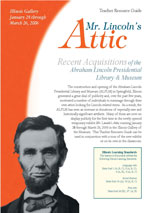Mr. Lincoln's Attic II: What's in a Name?
by by Abraham Lincoln Presidential Library and Museum
Grade Level
K-4, 5-8, 9-12+
Subject Arts - Visual, Social Studies
Subject Arts - Visual, Social Studies
Overview
For this plan, consider having students use MY HERO Gallery to upload students "artifacts" with their descriptions.
You may then use the Start an Organizer on your profile page area to put together a gallery of your student's pieces.
Created by the Abraham Lincoln Presidential Library and Museum, this lesson plan is part of a larger unit, which can be downloaded in its entirety in a pdf by clicking here.
Objectives:
Names have meaning. Parents choose names for their children for all sorts of reasons. The name might be a family one or the name of someone famous. Perhaps it was very popular at the time of the child's birth. Or maybe they simply liked the sound of it.
The intentions of Abraham Lincoln Marovitz's parents are obvious. They chose to name their fourth son after the 16th President. The impact upon the young Marovitz was extraordinary. He became a life-long student of Lincoln, studied law and, in 1938, became the first Jewish person ever elected to the Illinois State Senate. He also collected every book ever written about Abraham Lincoln's legal career. His collection included over 450 books, more than 100 prints and photographs and many other Lincoln-related items. He donated his collection, some of which is on display in Mr. Lincoln's Attic, to the Abraham Lincoln Presidential Library and Museum in 2002.
In this lesson, students will investigate the meanings behind their name and how their name may or may not influence their lives. They will use the techniques of Oral Historians to interview family members about their name origins.
The intentions of Abraham Lincoln Marovitz's parents are obvious. They chose to name their fourth son after the 16th President. The impact upon the young Marovitz was extraordinary. He became a life-long student of Lincoln, studied law and, in 1938, became the first Jewish person ever elected to the Illinois State Senate. He also collected every book ever written about Abraham Lincoln's legal career. His collection included over 450 books, more than 100 prints and photographs and many other Lincoln-related items. He donated his collection, some of which is on display in Mr. Lincoln's Attic, to the Abraham Lincoln Presidential Library and Museum in 2002.
In this lesson, students will investigate the meanings behind their name and how their name may or may not influence their lives. They will use the techniques of Oral Historians to interview family members about their name origins.
Procedure
- Using the Internet, have students research the meaning and origins of their names. Students should document their findings in a notebook or class journal.
- Using the Oral History Interview Worksheet, have students interview parents, relatives or other family members to discover the origins of their name. Brainstorm in class possible questions students might ask to discover the origins of their name.
Why did you choose my name?
Did you consider other names?
What is the nationality or origin of my last name?
Do you know other people with my name? - Upon completion of the interview, have students record their thoughts in a notebook or classroom journal using the following writing prompts:
What I heard that surprised me was…
Something I learned from the interview was…
One thing I thought was important from the interview was…
I have a question or would like to know more about… - Based upon their research findings, have students create a collage to express the origins of their name. Using art paper, have students write their name in large print in the center of the paper. Using crayons, markers, pens, etc. have students fill in the paper with drawings, symbols and designs that reflect the origin and meaning of their name, as well as their own personality.
- Have each student present their art work to the class, explaining how the symbols and designs express the origins and meaning of their name.
Assessment
Standards
Common Core English - Language 6-12
1
Conventions of Standard english: Demonstrate command of the conventions of standard English grammar and usage when writing or speaking.